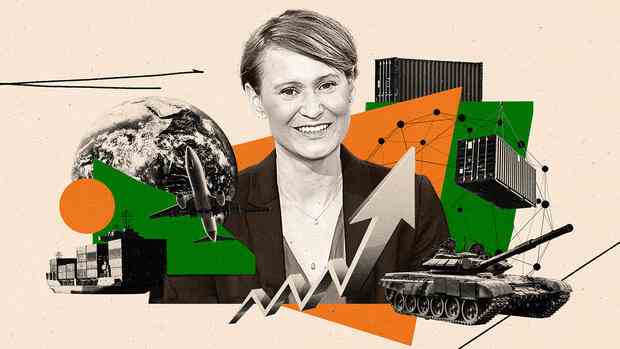dr Jana Puglierin is Head of Office and Senior Policy Fellow at the European Council on Foreign Relations (ECFR).
According to reports, French President Emmanuel Macron would have liked to travel to China together with Olaf Scholz (SPD) to send a European signal. But the Chancellor had other plans. In November 2022, accompanied by a German business delegation, he was the first to pay his respects to Xi Jinping.
At that time he had just been confirmed in the office of General Secretary of the Communist Party. Scholz then received a lot of criticism from Europe. Scholz seemed to be continuing his predecessor’s mercantilist China policy and continuing to focus on special German-Chinese relations.
Last week, the French President traveled to Beijing together with EU Commission President Ursula von der Leyen – but this trip did not signal European unity either. On the contrary. Macron had invited von der Leyen to make it clear that his visit was not just on behalf of France, but on behalf of Europe. Instead, the trip yielded three insights:
- FirstEuropeans are still deeply divided on how to deal with China in the future.
- SecondlyMacron is not “President of Europe”, but divides Europe at least as much as nationally.
- Thirdvon der Leyen and Macron have also failed to persuade Xi to make significant concessions with regard to Russia’s war of aggression in Ukraine.
Shortly before departure, von der Leyen found unusually clear words for China’s strategic priorities: the country is striving for security and control instead of reform and opening up. The aim is a systemic change in the international order according to Chinese ideas.
China relies on the targeted exploitation of dependencies, military build-up and close ties with Moscow. Von der Leyen deliberately avoided the established triad of “partner, competitor and systemic rival” and emphasized the need for active, strategic, multidimensional risk minimization when dealing with Beijing.
Macron wants to continue maintaining economic relations with China
Anders Macron. Even if he had demonstratively agreed with von der Leyen in the run-up to the trip, he struck a much more conciliatory tone in Beijing: less risk minimization, but more rapprochement after three years of rigorous restrictions caused by the Covid-19 pandemic.
French President Macron and EU Commission President von der Leyen visited Chinese President Xi Jinping in Beijing last week.
(Photo: AP)
Macron spoke of reviving the strategic and global partnership with China and deliberately avoided critical tones with regard to Taiwan. In tow he had a large business delegation that concluded numerous contracts in China.
Von der Leyen and Macron represent different ends of the European spectrum with their perspectives. What was perhaps planned as a “good cop, bad cop” strategy, which was nevertheless intended to set a common signal, was used by the Chinese side during the visit to present Europe.
Xi made it clear that Brussels does not count for him. Red carpet, state banquet and military parade for Macron – a sober reception at the regular passenger exit for von der Leyen. The commission president remained on the fringes – not just for Xi but, regrettably, for Macron as well. In the almost two-minute promotional video of his trip published on Twitter, she only appeared for four seconds.
Macron’s message to Xi was clear – and everyone can read it in an interview with the French newspaper “Les Échos”: Paris wants close economic ties with Beijing, even if China does not oppose the Russian invasion of Ukraine and continues to have very close ties with the Kremlin maintains.
Macron sees a great danger in being drawn into a conflict with Beijing by the United States over Taiwan. He wants to position Europe as a strategically independent force from China and the USA.
This is met with resistance in the rest of Europe. It is true that most other European countries do not want an economic decoupling from China either. However, strategic independence from the USA is not desired by many states, particularly in light of the war against Ukraine. They perceive Macron’s policy as “France first!”
>> Read here: Paris rejects criticism of Macron’s China statements
A Europe that is more internationally capable of acting cannot be built on Macron’s strategic premises – it would be urgently needed, and not only with a view to China. Foreign Minister Annalena Baerbock (Greens) and EU foreign policy chief Josep Borrell must now send a clear signal in Beijing this week that a strong Europe and a strong transatlantic partnership are not contradictory.
dr Jana Puglierin is Head of Office and Senior Policy Fellow at the European Council on Foreign Relations (ECFR).
More: Macron’s China statements are a faux pas – but they shouldn’t be overinterpreted either
